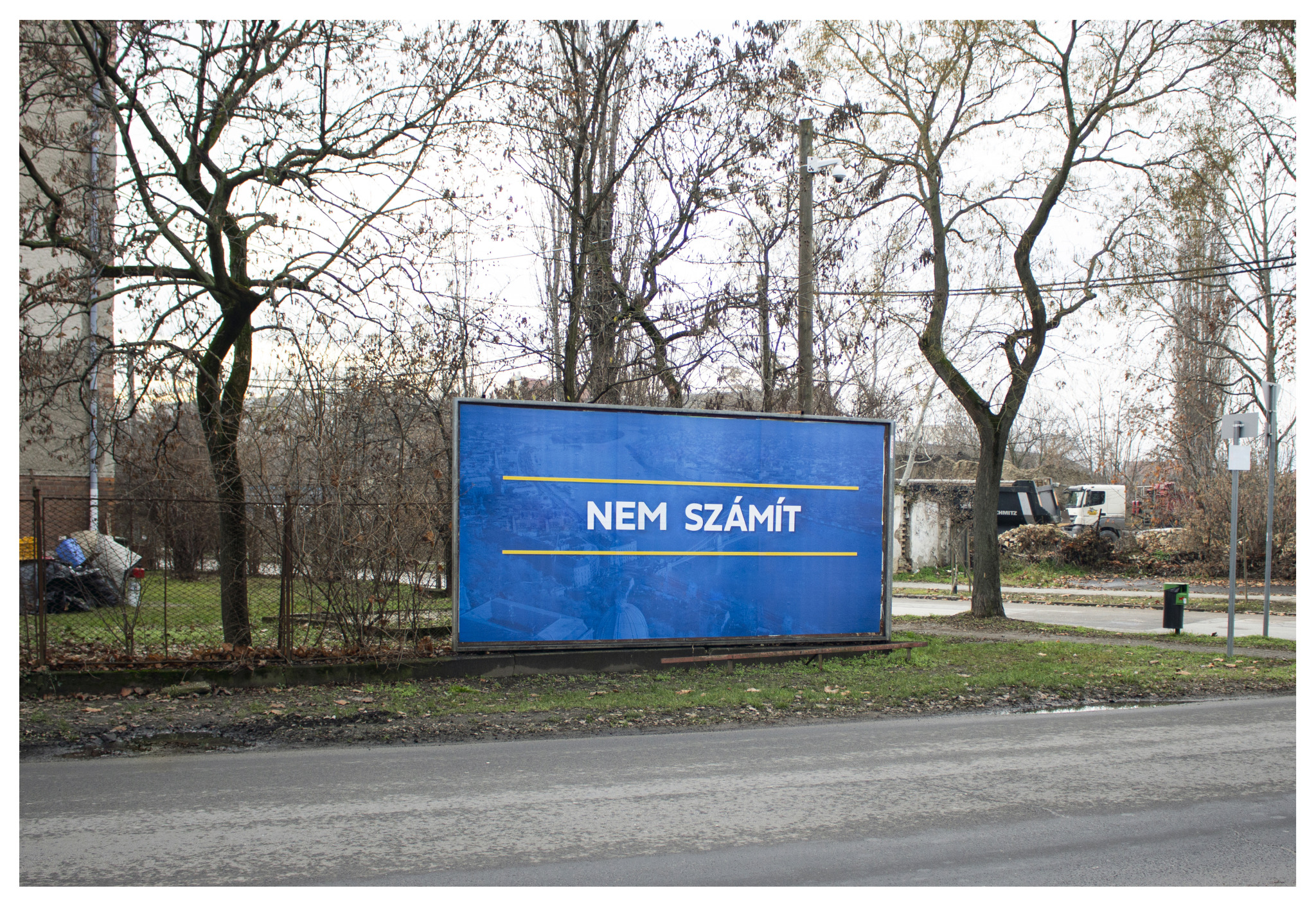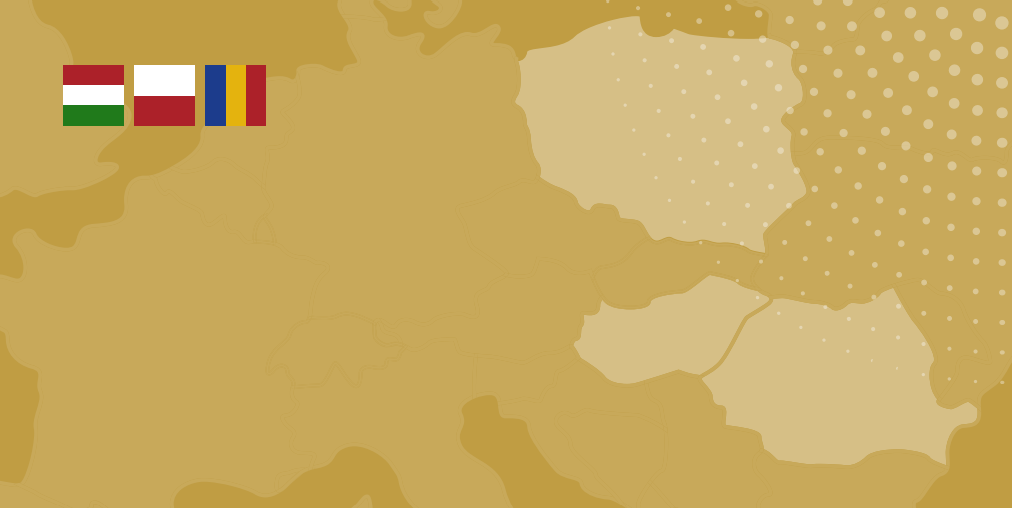When the pandemic reached Hungary ten years after the Fidesz party first gained a two-thirds majority, it was met by a solidified Orbán-regime. The systematic building of a clientele, the domination of the media, the liquidation of the autonomy of institutions and the eradication of democratic checks and balances have been completed, the framework of anti-corruption action has been degraded to the level of make-believe measures “complying with national characteristics”. In the state of emergency, the measures restricting the normal workings of democracy and the blurring of the notions of the rule of law, transparency, and public interest did not come as a surprise to a society hardened during the ten years in the so-called System of National Cooperation.

Billboard using the styles of official propaganda matterials saying "Doesn't matter".
How we saw 2020
In the hybrid regimes of today, the increasing concentration of power does not bring about a spectacular authoritarian turn. Despite the growing police presence and the increasingly forceful action against the protests, this is not the type of state of emergency often seen in the 20th century, with a regime turning authoritarian by way of a coup. The state of emergency rather leads to isolation, moreover, it tears down the remnants of democratic accomplishments that hold the arbitrary spending of public funds by the central government under at least some degree of control.
Our “illiberal democracy” continues to emphasize its direct connection with the voters, the agenda, however, is set by the government. Social dialogue has turned hollow and shouting down has become the general norm of communication. We will remember an executive power operating in a way that is obscure to the outsider, a rule that is hasty and lacks any consultation, where the democratic debate is substituted by communication taking place within the social media account of the prime minister. Regarding the management of the pandemic, we were rarely able to understand the reasons behind the government measures.
2020 has shown that – as opposed to having a decent public life – the distortions of our democratic life have made us weaker, more frustrated and vulnerable. That is why the initiatives fighting to protect civil and social autonomy – whether in the press, higher education or matters of local resistance – emerging in spite of the pandemic situation carried so much meaning. However trifle these attempts may seem vis-à-vis the construction of reality by a government speaking the language of force, they are noteworthy for expressing the need for decent politics, for trying to create the right conditions and tearing down the obstacles in their own environment. At K-Monitor, we tried to stand up for the same kind of decency by advancing technological development and knowledge and strengthening participation, by spreading good practices, whether it’s about self-government, so-called gratitude money or state investments. We now look back on the past year of K-Monitor and its struggles: this is how an anti-corruption NGO saw the year of 2020.
In 2020, our volunteers continued to review the articles written by investigative journalists. Over 1200 individual articles were added to our press database focussing on corruption and public funds, which has been opened 731.000 times by over 260.000 users.
Transparency
The insufficient disclosure of epidemiological data in the emergency situation during the springtime, the increasingly arbitrary publishing of the data of public interest as well as the 45+45-day deadline to provide requested data without the need for justification – all these factors did not help to make public decisions more transparent. In 2020, the implementation of the right to information largely depended on the goodwill of the government. Although the flow of information did not cease in the receding media coverage, the scarcity of official and authentic data made it easy to dismiss any statement as fake news.
In 2020, we continued our push for more transparency in various areas of government by requesting and processing data of public interest. It was us, rather than the state, to make the subsidies given to multinational companies by individual decisions of the government, as well as the spending of the Modern Cities Programme more accessible. As usual, we presented the distribution of last year’s agricultural subsidies and named their biggest beneficiaries. We repeatedly addressed the issue of the billions of government-money pouring into tourism, revealing how the government fattens Hungary’s most wealthy and influential people with additional resources, while the small players are being fed crumbs. We looked into the question of who accompanied Viktor Orbán on his travels abroad over the last years and reported on the enrichment of various members of the government. We published eye-catching data visualisation on who sail together on Lake Balaton.
We revealed the inability of the tax authorities to recover the campaign funds given to fake parties, resulting in a debt of over 3 billion HUF since then. However, the perversity of campaign funds is not limited to fake parties: as pointed out recently, the Fidesz-candidate spent over the legal limit just on Facebook ads in the Borsod county by-election. We were the ones reporting on Péter Szijjártó, the Minister of Foreign Affairs granting exemption to the procurement linked to coronavirus – including the botched purchase of ventilators conducted by his own ministry. We published over 50 blogposts in 2020, seen by 168.000 users, resulting in 270.000 page views.
Technology and knowledge
Hotel Oligarch was launched – a map of hotels and restaurants linked to politicians, a project financed by crowdfunding and created with the help of volunteer programmers. The map was visited by 300.000 users over 600.000 times over the summer. Among our technology projects, we worked a lot on our open-source tool presenting local government budgets. Our search tool for parliamentary speeches and our Red Flags public procurement monitoring system continue to be used by many.
Organized by the group called Code for Hungary we are currently building a community of volunteer programmers and developers to support socially useful ideas that have technological requirements. In reaction to the epidemiological situation we launched a forum as a first step in developing ideas that aim to relieve circumstances caused by the crisis.
We published several studies in 2020 as well. Corruption Watch, published every three months by TASZ and K-Monitor has seen two issues already. The goal of the study is to assess the attempts at state corruption and the cutting back of the rule of law. Together with our foreign partners, we began to analyse the public procurements under the thresholds set by the EU and wrote a guide for local authority decision-makers to help them avoid the most common pitfalls of public procurements.

In a joint project with the Romanian NGO Funky Citizens and EMMA, an association striving to improve the situation of mothers, we tackled the topic of so-called gratitude payment. We set up the birthing experience-map of igyszultem.hu – a tool of our research on the one hand, it also serves as a source of information for mothers by providing public and anonymous data: feedback of over 11.000 deliveries in Hungary can be found on the website. Our analysis of gratitude money processing the accounts of the mothers came just at the right time, as the government is about to sweep under the rug the corruption in maternity care and considers granting exemption from the ban of gratitude money introduced in 2021.
Participation
We continued to prioritise the topic of local self-government, as well as the question, how the strengthening of transparency and participatory democracy could contribute to a new kind of political culture on the local level. The pandemic situation was aggravated by the government’s political revenge-campaign waged against the major cities, stripping them of funds and nationalising their competencies. As our round-table discussion on the future of self-government has shown: we have reached the limits of true self-government.
We couldn’t rely on the government when it came to transparency, either: the transparency portal promised to the EU providing access to data of public interest to the citizens remains unfinished.
As part of our campaign called “This is the Minimum!” we were not the only ones to receive requests and questions concerning the improvement of disclosure, we also asked the members of municipalities who had committed themselves to transparency in October 2019 for their reports. There has been more commitment than actual regulatory work, to some extent to be explained by the emergency mode.
Although the budget cuts have led to uncertainty towards the end of the year, by then a couple of important questions have been raised in municipal politics: the so-called party district of Budapest, the bicycle lanes, the promotion of community solutions, as well as the inclusion of residents using innovative tools (communal assembly, e-participation). At the beginning of the year, K-Monitor was the one to write the first major publication on the topic in Hungarian language – and we are proud of the fact that Budapest has set up a participatory budget worth 1 billion HUF, to be continued in 2021 despite the cuts. One of our colleagues was part of the team creating the concept of the participatory budget of Józsefváros, the 8th district of Budapest – which, for the time being, has been put on hold by the epidemic.
In reaction to the lack of funding available for local initiatives we created a series of blogposts and held an online workshop for the municipalities on the possibilities of social community financing. Our publication titled “On the Same Platform – local community solutions against the pandemic” has been issued, introducing 10 good examples.
EMPOWERING LOCAL SELF-GOVERNMENT - COOPERATION BETWEEN ADVOCACY GROUPS AND LOCAL GOVERNMENTS
Together with our partners EPF and Funky Citizens, we conducted 64 semi-structured in-depth interviews with representatives from 35 organizations in 35 different local entities in Hungary, Poland and Romania, involving both activists and local government officials. Our main ambition was to learn about the narratives used by our informants to describe their efforts to transcend the difficulties of their local political contexts, especially regarding conflict-of-interest situations and their dilemmas about the roles they play.
In 2021, we will carry on monitoring the local government transparency project “This is the Minimum!” while assisting the actors devoted to the program. We will begin to develop an online application designed to help involve the population, and the good practices of participation will remain high on our agenda as well. Our project on gratitude money continues, too: we are going to make igyszultem.hu easier to use to help keep mothers informed during the health care reforms that are often difficult to follow.
Without you, it would not be possible!
In 2020, we had a budget of roughly 44 million HUF at our disposal, half of which was spent on the salaries of our co-workers. The rent and overhead costs of our office amounted to a little more than 3.5 million HUF and we spent 1 million HUF on bookkeeping and banking. The rest of our expenses was made up by commissioned work. In 2020, our main sponsors were the National Endowment for Democracy, the Sigrid Rausing Trust, the European Commission, and the OSIFE. We conducted research and provided expertise worth 5 million HUF. Of all our income, we are most proud of the 3.2 million HUF we received from our donors as well as the 1% tax donations adding up to 1.2 million HUF. Without these, many of our projects could not have been realized.
We hope that you will stay with us in 2021, too!
Follow us on Twitter and check #ENGLISH for more English materials like this!
- and contribute to democracy in Hungary,
- be part of the development of innovative tools,
- and help us advocate transparency and accountability.
This is an extract from our original blogpost, which can be found here (in Hungarian).
Címkék: english
Szólj hozzá!
A bejegyzés trackback címe:
Kommentek:
A hozzászólások a vonatkozó jogszabályok értelmében felhasználói tartalomnak minősülnek, értük a szolgáltatás technikai üzemeltetője semmilyen felelősséget nem vállal, azokat nem ellenőrzi. Kifogás esetén forduljon a blog szerkesztőjéhez. Részletek a Felhasználási feltételekben és az adatvédelmi tájékoztatóban.






